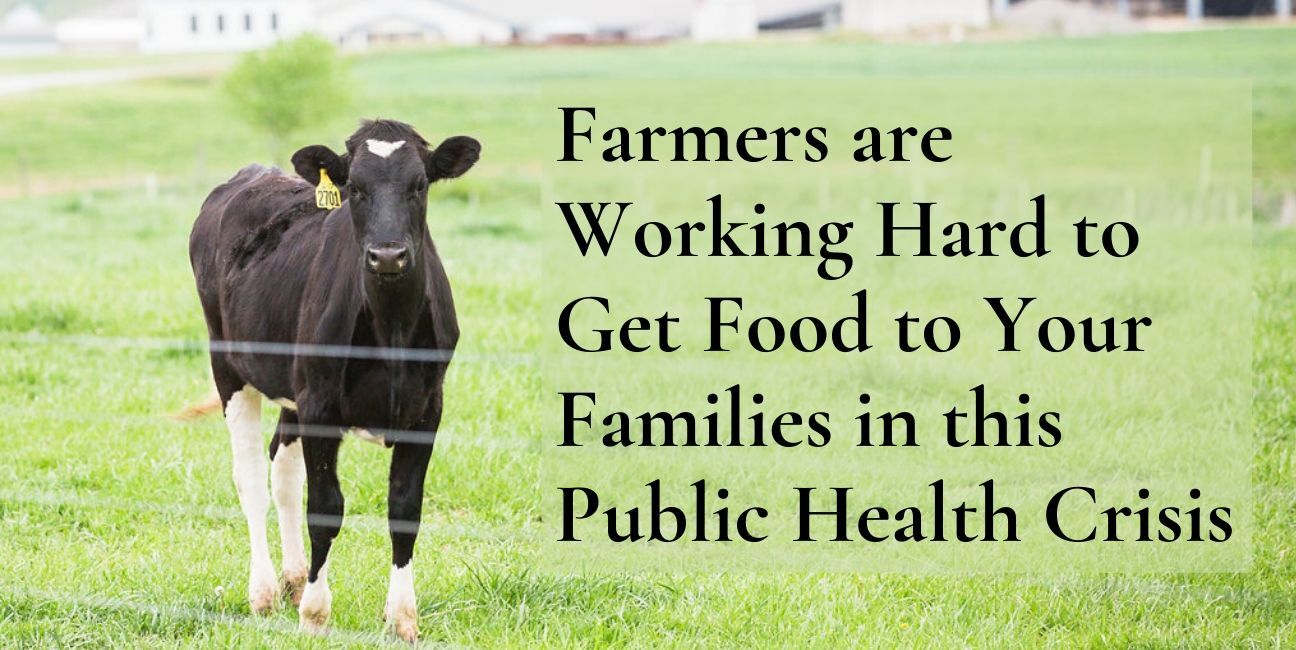Opinion Column by Member Lisa Graybeal, Peach Bottom, Pennsylvania
As I walked into our milking center in our big red barn the other morning, I could hear the satisfying swish, swish of milk flowing from our Holstein cows. I let out a little cheer of encouragement to our cud-chewing ladies to keep up the good work because now more than ever it’s important to keep the food flowing in this country.
It has certainly been disconcerting these past few weeks to face empty shelves in our supermarkets and retail stores since the onset of the COVID-19 pandemic. Rows of canned goods are picked over, the frozen food and bread sections annihilated and meat and deli counters bare. For the first time in many generations, Americans have had to wait in line to buy food and are subjected to rationing.
But as a dairy farmer and food producer, I want to reassure everyone that our unfilled grocery stores are not a reflection of the availability of food in this country. We are not short of food. In many cases, food production is set to increase this year.
“Pennsylvania’s supply chain is solid,” Pennsylvania Agriculture Secretary Russell Redding said in late March. “Farmers, production facilities and truckers are all still working. The food supply is safe and reliable. But the supply chain needs time to catch up to the sudden changes in demand.”
Though this country has the food, it’s not easy to modify its distribution stream so quickly. With restaurants closing altogether or limiting their sales to takeout or delivery and schools shuttered, combined with the huge uptick in supermarket sales, food processors and distributors were forced into redirecting their products, and they stepped up to the challenges.
“It is an amazing testament to the agility of our American supply chains that, in a month’s time, they were able to switch huge volumes of meat from food service to retail outlets,” remarked Dave Swartz, assistant director of animal systems for Penn State Extension.
Many dairy processors, for example, converted their production lines from filling half-pint bottles for schoolchildren to making more gallons and half-gallons to stock refrigerated dairy cases in supermarkets that seemingly empty as quickly as they’re replenished.
The dairy supply chain — like other food sources from the farm to kitchen tables — has been identified by the federal government as essential critical infrastructure. My family farm is a member of the Maryland & Virginia Milk Producers Cooperative and its processing plants are reportedly running at full capacity to supply customers without interruptions. Much of our farm’s milk gets delivered to Lancaster’s Turkey Hill.
“Our farmers are producing the same fresh, local milk and dairy products that consumers have always enjoyed. Know that our team is keeping the pipeline moving, and that we are replenishing customers as fast as possible,” said Jay Bryant, the cooperative’s CEO.
The United States Department of Agriculture is forecasting that American production of all sources of animal protein will increase this year.
More milk, meat and eggs are available today than last year at this time — in fact, sadly, some Lancaster County farmers were forced last week to dump some milk, a travesty given that so many people need it. We just have no way to get it to them. This is an issue that must be addressed in the weeks to come.
Pork supplies are already up by 6%, and beef and chicken are expected to increase by 2%, as is milk production.
A snapshot of Pennsylvania’s food production last year shows 100 million gallons of milk and 700 million eggs were supplied to consumers. On the produce side, there were 500 million pounds of apples and 16,500 tons of peaches harvested in the state. Wheat and soybean production set yield records in 2019 and corn production was above average. Farmers in this state annually produce more than 570 million pounds of mushrooms.
“The supply side has not changed as a result of this crisis. Farmers are still out there working every day, seven days a week to feed the citizens of this commonwealth,” said Steven C. Loerch, senior associate dean at Penn State College of Agricultural Sciences.
Indeed, life remains about the same for my family in our day-to-day operation of our dairy farm. Our cows are still milked three times a day and fed and cared for as usual, though we’re trying to practice social distancing as best we can and, as always, maintaining strict sanitizing practices.
We are anxiously watching our cover crop of rye grow quickly and are getting ready for the spring harvest while keeping an eye on the unpredictable early spring weather. My family and our employees are thankful we have our jobs to do; we know many people aren’t so lucky in these uncertain times.
Redding and other leaders at the Pennsylvania Department of Agriculture are urging residents not to panic-buy and hoard food, as this can compromise the food distribution system. Buying more than you need, Redding added, also keeps emergency food from getting to the most vulnerable people like those who rely on food banks and food pantries
“Everyone can help the supply chain work by staying home, staying calm and staying safe,” Redding said.
Perhaps through all of this there is a lesson to be learned. Americans enjoy a safe, abundant and affordable food supply available every day. Now that this coronavirus pandemic has established itself and changed our daily lifestyles, it is my hope that consumers have an appreciation for the complex and sophisticated food system that’s in place to ensure a well-fed society.
As Redding said: “Retail food workers are among the heroes in this pandemic. So are the farmers who feed us day-in and day-out, regardless of natural disaster, pandemic or economic turndown.”
Lisa Graybeal farms with her brother Byron and father Steve in Peach Bottom, Pennsylvania. Together they operate Graywood Farms an 700-cow, 1,200-acre dairy farm that has been in their family for three generations.


